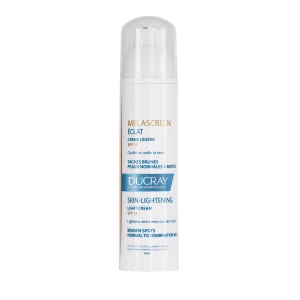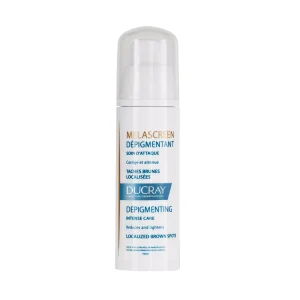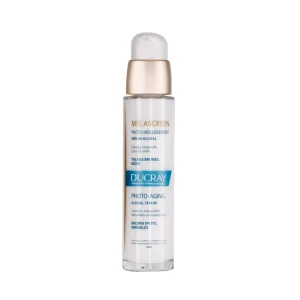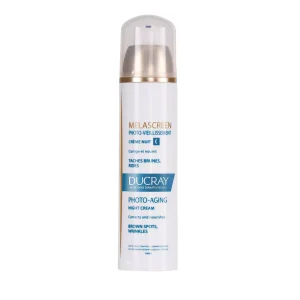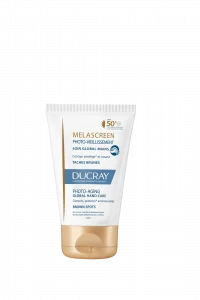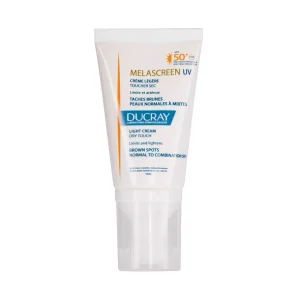
We all have some sort of skin problems. While most of us struggle with the signs of aging, pigmentation and dark spots are another major skin problem for which we want a permanent solution. To get rid of it, you have to trust depigmenting creams that work on the skin cells and give you an even complexion. To help you choose the best anti-pigmentation cream, we reached out to the dermatologist and cosmetologist Dr. Dina Mohamed. Read on!
Pigmentation Disorders: What Causes Them?
First of all, what is a skin pigmentation disorder? Hyperpigmentation is a common, usually harmless condition in which areas of the skin become darker than the surrounding normal skin. This darkening occurs when excess melanin – the brown pigment that produces normal skin color – forms deposits in the skin.
In addition to genetics, the most common external factors that can contribute to hyperpigmentation and pigmentation disorders are:
- Excessive sun exposure
- Hormonal changes (pregnancy, birth control pills, menopause)
- Environmental pollution
- Natural aging of the skin
- Post-inflammatory hyperpigmentation following acne.
Keep in mind that hyperpigmentation can affect people of any race.
What are the different forms of skin pigmentation disorders?
Dark spots and hyperpigmentation occur mainly on the face, but they can also affect other parts of the body. Most of the pigmentation problems are benign and completely harmless.
1- Age spots:
As the name suggests, age spots tend to be more common in older people. Unfortunately, as we age, cell turnover slows down quite significantly and it takes longer to replace and repair old skin cells. After years of exposure to UV light and pollution, melanin builds up and creates small, flat, dark skin spots, also known as age spots, sun spots, or solar lentigines.
2- Freckles:
Freckles are caused by genetics and sun exposure. These small brown spots are usually found on the face or other parts of the body exposed to the sun. They are usually darker in the summer, while they fade or even disappear in the winter.
3- Melasma:
Hormonal changes can affect the appearance of the skin. Melasma or chloasma is a skin pigmentation disorder characterized by dark spots that often appear during menopause or when using hormonal contraception, but it can also be triggered by sun exposure. Many pregnant women have melasma, which is why it is also called “the mask of pregnancy”. Melasma often disappears after delivery.
4- Post-inflammatory hyperpigmentation:
Post-inflammatory pigmentation is a discoloration that occurs as a result of inflammation or injury (such as acne, burns, cuts, eczema, or psoriasis).
Read on to find out the best ways to treat pigmentation and the best pigmentation cream recommended by dermatologists.
What should I look for in a pigmentation cream?
Dr. Dina Mohamed insists that using whitening creams is a way to get rid of pigmentation.
Here are the best ingredients to look for in a pigmentation cream if you want to lighten uneven skin:
1- Vitamin C
Don’t settle for orange juice: Vitamin C can be used as a topical antioxidant. Vitamin C helps prevent free radicals from causing oxidative damage to the skin (which can lead to wrinkles and a dull complexion, among other things). Dr. Dina Mohamed notes that vitamin C can also reduce hyperpigmentation by blocking the production of melanin and thus reducing dark skin coloration.
Another benefit is that vitamin C only lightens problematic areas of pigmentation, not the rest of the skin.
2- Hydroquinone
Hydroquinone has been the gold standard in dark spot treatment for over 50 years. On a biological level, hydroquinone inhibits an enzyme called tyrosinase, which is involved in the production of melanin. Naturally, the less tyrosinase is produced, the less melanin is produced.
3- Kojic acid
Kojic acid is commonly used in skin lightening products and is best used in combination with hydroquinone for optimal results. It works by suppressing a key factor in pigment cell activity. Also, don’t expect quick results – it can take several months to see an improvement in hyperpigmentation with the use of topical kojic acid.
4- Azelaic acid
Azelaic acid is a natural extract of oats, wheat, or rye that interferes with the production of abnormal pigmentation. Bonus: it has antibacterial properties that can help clear up acne and scars left by pimples.
5- Glycolic acid
Glycolic acid exfoliates and removes darker dead skin cells from the surface of your skin, revealing a fresh complexion with a more even tone. With regular use, this process effectively fades hyperpigmentation.
Dr. Dina Mohamed also recommends looking for a pigmentation cream with long-lasting sun protection.
So, what is the best cream for skin pigmentation? We’ve rounded up our best treatments for pigmentation.
*For uneven skin tone:
Ducray Melascreen Eclat Light Cream SPF15: Apply morning and/or evening to the entire face, neck, and back of the hands.
*For localized hyperpigmentation:
Ducray Melascreen Depigmenting Intensive Care: Enriched with azelaic acid and glycolic acid, it corrects and reduces localized hyperpigmentation. Apply morning and evening to the affected areas.
* For brown spots related to wrinkles:
The following products are specially designed to treat signs of aging such as brown spots, wrinkles, and fine lines, leaving the complexion even, smooth, and rejuvenated.
Ducray Melascreen Photo-Aging Global Serum
Ducray Melascreen Photo-Aging Night Cream
Ducray Melascreen Photo-Aging Global Hand Care: Apply to the hands as often as needed.
How can I prevent hyperpigmentation and dark spots?
- Always use a broad-spectrum sunscreen with a high UV protection factor (SPF 50) – all year round and even indoors if you are sitting right next to a window. Dr. Dina Mohamed assures that hyperpigmentation can be avoided by wearing sunscreen.
If you are pregnant, we recommend using mineral-based sunscreen. Make sure to protect not only your face but also your hands to prevent dark spots from forming in the sun.
Check out the sunscreen for pigmentation below, which offers the highest level of UVA and UVB protection to help minimize the appearance of sun-induced hyperpigmentation.
Ducray Melascreen UV Light Cream SPF50+
- Dermatologists recommend avoiding prolonged exposure to the sun or tanning beds. These are among the most common causes of dark spots on the skin.
- Wear a hat or other clothing to provide extra sun protection for your face and neck.
- Support your skin with the high-quality dark spot corrector products mentioned above to get rid of dark spots and control hyperpigmentation.
- Genetics is an important factor. Have you noticed that hyperpigmentation runs in your family? If so, you need to take extra care of your skin and use the right skin care products to prevent brown spots from getting worse.
A comment from The Dermo Lab
Dealing with a skin pigmentation disorder can be difficult, even if it doesn’t affect your health. The emotional struggle can have a significant impact on your mental well-being. The good news is that many skin pigmentation disorders are not serious and can be treated with good skin care. It is important to stay positive when dealing with a skin pigmentation disorder and remember that all skin is beautiful.

